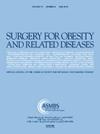体重和体形高估及其与减肥手术后4年患者焦虑、抑郁和饮食不良症状的关系
IF 3.5
3区 医学
Q1 SURGERY
引用次数: 0
摘要
背景:体重和形状高估(WSO;体重和体型对自我评价的过度影响在接受减肥手术的个体中很常见。对于远离手术的患者,WSO与预后较差的关系知之甚少。目的:研究减肥手术后4年内WSO与焦虑、抑郁症状和各种不适应饮食行为之间的关系。地点:美国亨利·福特健康中心。方法:邀请2018年至2021年接受手术的患者在2021年至2022年完成研究。参与者(N = 765)完成焦虑、抑郁症状和饮食行为测量。结果:参与者认可中度WSO (M = 3.62,标准差= 1.87),与焦虑(r = 0.37)和抑郁(r = 0.20)症状呈正相关;因愤怒/沮丧(r = 0.26)、焦虑(r = 0.28)和抑郁(r = 0.31)而进食;成瘾性饮食行为(r = 0.26);并且与失去控制(优势比[OR] = 1.39)、暴食(OR = 1.39)和放牧(OR = 1.24)饮食的存在显著相关。WSO也与更频繁的放牧有关(r = .23),但与行为存在的参与者失去控制或暴饮暴食频率无关。结论:研究结果强调了WSO、精神困扰和不适应饮食行为之间的联系在减肥手术后持续长达4年。这些领域应该在减肥随访中进行评估,WSO的评估可以帮助提供者识别有不良预后风险的患者。研究结果应该用于告知WSO如何使患者易患较差的肥胖结果的时间模型。本文章由计算机程序翻译,如有差异,请以英文原文为准。
Weight and shape overvaluation and its relation to anxiety, depression, and maladaptive eating symptoms for patients up to 4 years after bariatric surgery
Background
Weight and shape overvaluation (WSO; undue influence of weight and shape on self-evaluation) is common among individuals undergoing bariatric surgery. Little is known about how WSO relates to poorer outcomes for patients remote from surgery.
Objectives
To examine associations between WSO with anxiety and depression symptoms and various maladaptive eating behaviors in patients up to 4 years post-bariatric surgery.
Setting
Henry Ford Health, United States.
Methods
Patients who underwent surgery between 2018 and 2021 were invited to complete the study between 2021 and 2022. Participants (N = 765) completed anxiety and depression symptom and eating behavior measures.
Results
Participants endorsed moderate WSO (M = 3.62, standard deviation = 1.87), which was positively related to anxiety (r = .37) and depression (r = .20) symptoms; eating in response to anger/frustration (r = .26), anxiety (r = .28), and depression (r = .31); and addictive eating behaviors (r = .26); and was significantly associated with the presence of loss-of-control (odds ratio [OR] = 1.39), binge (OR = 1.39), and graze (OR = 1.24) eating. WSO also was related to more frequent grazing (r = .23) but not loss-of-control or binge eating frequency for participants who endorsed behavior presence.
Conclusions
Findings underscore that links between WSO, psychiatric distress, and maladaptive eating behaviors persist up to 4 years after bariatric surgery. These domains should be assessed at bariatric follow-ups, and assessment of WSO may help providers identify patients at risk for poorer outcomes. Findings should be used to inform temporal modeling of how WSO may predispose patients to poorer bariatric outcomes.
求助全文
通过发布文献求助,成功后即可免费获取论文全文。
去求助
来源期刊
CiteScore
6.70
自引率
12.90%
发文量
570
审稿时长
56 days
期刊介绍:
Surgery for Obesity and Related Diseases (SOARD), The Official Journal of the American Society for Metabolic and Bariatric Surgery (ASMBS) and the Brazilian Society for Bariatric Surgery, is an international journal devoted to the publication of peer-reviewed manuscripts of the highest quality with objective data regarding techniques for the treatment of severe obesity. Articles document the effects of surgically induced weight loss on obesity physiological, psychiatric and social co-morbidities.

 求助内容:
求助内容: 应助结果提醒方式:
应助结果提醒方式:


